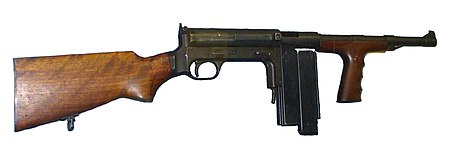- Reaction score
- 146
- Points
- 710
Also learned in the book about the Marlin M42 submachine gun:
More:
http://www.historicalfirearms.info/post/78048160002/united-defense-m42-developed-by-high-standard
Also a Marlin M2:
http://www.historicalfirearms.info/post/109815849250/hyde-inland-m2-submachine-gun-the-hyde-m2-is-the
Mark
Ottawa
"...
Intended for use by U.S. troops at the time of its design, it found more favor being air-dropped to partisan forces in occupied Europe. The weapon was air dropped to supply British-led partisan forces on the island of Crete, where it was used extensively. It also saw use among the partisan forces of the Italian and French Resistance. Some of them were transferred to Dai Li's regular resistance forces in China for use against the Japanese invasion. The United Defense M42 was issued for use by Filipino troops under the Philippine Army and Philippine Constabulary during World War II from 1942 through the Post-World War II era until the 1960s and was used by the local recognized guerrillas from 1942 to 1945 during the Japanese Occupation.[citation needed] The use of the 9 mm caliber allowed resistance forces to use captured ammunition in their weapons, eliminating the need for repeated re-supply drops..."

https://en.wikipedia.org/wiki/United_Defense_M42
More:
http://www.historicalfirearms.info/post/78048160002/united-defense-m42-developed-by-high-standard
Also a Marlin M2:
http://www.historicalfirearms.info/post/109815849250/hyde-inland-m2-submachine-gun-the-hyde-m2-is-the
Mark
Ottawa

